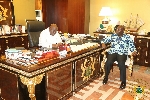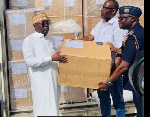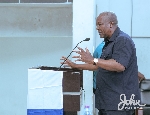Behavioural change key in fighting plastics – Stakeholders

“We call for concerted behavioural change from the public to deal with plastic because the issue is not plastics per se, but littering, and our attitude towards waste management must change”, noted the panelists at the dialogue.
The multi-stakeholder dialogue, organised as part of activities of the Waste Recovery Platform being facilitated by UNDP, enabled the participants to share information on ongoing policy and project initiatives on plastic management to stimulate partnerships for accelerating the delivery of tangible solutions for plastic management in the country.
Plastic pollution has become a major development challenge across the world. In Ghana, recent statistics show that the country generates about 1 million tonnes of plastic waste annually. Out of this, only 2 to 5% (22,000 to 55,000) is recycled. The rest ends up on landfill sites (38%), lands (28%), in the sea (23%), or get burned (11%).
In line with the target 5 of the Sustainable Development Goal 12 (Responsible Consumption and Production), which calls for a substantial reduction in waste generation through prevention, reduction, recycling and re-use by 2030; the participants at the dialogue recognised the importance of state institutions, civil society, the academia and private sector actors working together on awareness creation, innovation and infrastructure to promote waste recovery.
The stakeholders also called for the enforcement of sanitation by-laws to prevent littering. In this regard, the Sustainability and Resilience Advisor for the Accra Metropolitan Assembly, Mr Desmond Appiah, disclosed that the Assembly has renovated its sanitation courts and stepped up efforts to enforce sanitation by-laws, as per the provisions in Act 851 section 56 (a) and (b) of the Public Health Act 2012.
The dialogue brought together over 150 stakeholders from development agencies, the public and private sectors, as well as academia and civil society, who are members of the Waste Recovery Platform.
The panelists who championed the discussions from the public sector involved representatives from the Ministry of Environment, Science, Technology and Innovation (MESTI), Ministry of Sanitation and Water Resources, and the AMA. Non-state actors included representatives from the University of Ghana, the Environmental Service Protection Agency (ESPA), the Department for International Development (DFID) and the Ghana Recycling Initiative by Private Enterprises (GRIPE).
The ‘Waste’ Recovery Platform is a one-stop shop solution being developed to connect key stakeholders in the waste management value chain to promote waste recovery in a larger circular economy context.
The Initiative has four components:
(1) a digital platform to connect stakeholders to facilitate waste recovery, which will be equipped with tools such as a waste map, a compendium of technologies, and mobile application for trading of waste;
(2) a convening mechanism that brings together all the stakeholders together on a periodic basis to discuss issues of common interest and forge partnerships;
(3) a business competition where, at least, eight innovative projects will be awarded seed capital to demonstrate waste recovery in Ghana; and
(4) a communication and advocacy component that aims at creating awareness and increasing knowledge for general behavioral change to make waste recovery systems effective.
Source: Ghana/ClassFMonline.com/91.3FM
Source: Emmanuel Mensah
Trending News

Sign Ghana National Service Authority Bill into law – NSS begs Akufo-Addo
10:53
MoH receives first batch of donated medical supplies after a year-long port delay
02:51
Akufo-Addo and Ouattara inaugurate Côte d'Ivoire-Ghana Cocoa Initiative Secretariat today
07:45
Geopolitics split African states’ response to Iran-Israel tension
10:37
Jefferson Sackey advocates peace and tolerance at Eid-ul-Fitr celebration
02:04
Akufo-Addo commissions Kumasi Thermal Power Plant and Genser Energy Kumasi Pipeline
06:27
Gov’t releases ₵26m to institutional suppliers
11:52
PAC orders East Gonja Municipal Assembly to pay contractor GHS92,704 with interest
06:09
Feeding grants'll be paid directly to school heads in my next gov’t – Mahama promises
11:02
Lack of public purse protection ‘pathetic’ – Sam Jonah calls out ‘weaponisation of state agencies against opponents, assault on press freedom'
04:02



